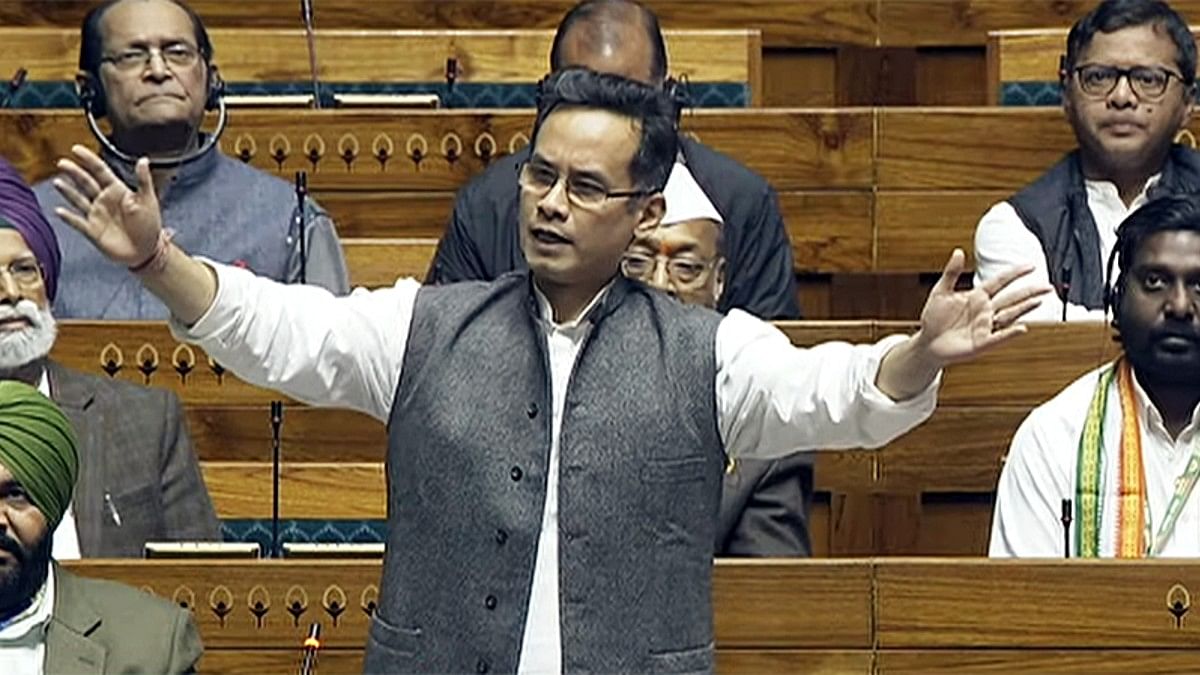New Delhi: A Lok Sabha discussion on the Ram temple in Ayodhya Saturday saw the Congress stressing that while it believes in secularism rooted in Gandhian ethos, the party does not endorse the way the western world defines it.
The Congress’s articulation that it was opposed to the western secular notion assumes significance in light of the party’s continuing struggle to find a language to counter the BJP riding on the religious fervour generated by the consecration of the Ram temple ahead of the Lok Sabha election.
“We believe in secularism. But we do not endorse the western definition of secularism. If you look at debates when the term secularism was inserted in the Constitution, the Congress MPs had said that they do not advocate the western notion of secularism. India is a religious country and we believe in Sarva Dharma Samabhava,” Congress MP Gaurav Gogoi said, opening the discussion on his party’s behalf.
He also made repeated references to the concept of Ram Rajya, developed by Mahatma Gandhi, saying the Congress has always walked on that path, while the BJP regime witnessed the “backward, deprived and exploited classes” facing “growing oppression”.
The Congress had turned down an invite from the Shri Ram Janmabhoomi Teerth Kshetra Trust to former party president Sonia Gandhi, incumbent party chief Mallikarjun Kharge and its Lok Sabha leader Adhir Ranjan Chowdhury to attend the consecration ceremony, held on 22 January, saying the RSS and the BJP have long made a political project of the temple in Ayodhya.
Later, party leader Rahul Gandhi had said that the Congress could not have attended the consecration as Prime Minister Narendra Modi had turned it into a “political and election event”. While Rahul is on the Bharat Jodo Nyay Yatra, Sonia Gandhi and Chowdhury were also present in the House during the discussion on what was the last day of proceedings of the 17th Lok Sabha.
To be sure, former Congress leaders, including Jawaharlal Nehru, Indira Gandhi and Rajiv Gandhi had also in the past drawn a distinction between the secular idea espoused by the Congress and its western conception that is defined by a separation between the church and the state.
For instance, Rajiv Gandhi had said in 1986 that “secularism is the bedrock of our nationhood, secularism as defined not in the English dictionaries, where it is defined as ‘non-religious’ or ‘anti-religious’, but secularism the way Pandit ji defined it as Sarva Dharma Samabhava which allows every religion to flourish in our country.”
Nehru had also dwelled on the issue, saying it was perhaps not very easy even to find a good word in Hindi for the term ‘secular’.
“Some people think it means something opposed to religion. That obviously is not correct. What it means is that it is the state which honours all faiths equally and gives them equal opportunities; that, as a state, it does not allow itself to be attached to one faith or religion, which then becomes the state religion,” Nehru had said.
However, with the rise of the BJP in the recent years, the Congress has increasingly found itself on the backfoot on this issue, with its principal rival accusing it of indulging in minority appeasement and being anti-Hindu in the name of secularism. In that context, Gogoi’s articulation marks an attempt by the party to reorient its position on this crucial issue.
In his speech, Gogoi said the Congress welcomes the Supreme Court judgement which paved the way for the construction of the temple.
While Gogoi skirted any mention of the 1992 demolition of Babri Masjid — which once stood on the land where the temple has come up — AIMIM MP Asaduddin Owaisi in his speech raised the slogan, “Babri Masjid zindabad”.
Owaisi, known for his firebrand oratory, said the discussion amounted to “celebrating” the demolition of the mosque, which was held as an “egregious violation of the rule of law”.
“The Supreme Court judgment said the destruction of the mosque and obliteration of Islamic structure was an egregious violation of the rule of law. It means it was a criminal act…What message are you sending out to the 17 crore Muslims of this country who are feeling alienated,” Owaisi said.
He also took a swipe at “secular parties”, saying their silence on the issue reflected their approval. “The light of Indian democracy is at its dimmest. Babri Masjid hai aur rahegi (was and will remain), Babri Masjid zindabad, Bharat zindabad, Jai Hind,” Owaisi said in his concluding remarks.
Meanwhile, Gogoi claimed that Rahul was prevented from visiting Batadrava Satra, the birthplace of Assamese saint and socio-religious reformer Srimanta Sankardeva, on 22 January as Assam Chief Minister Himanta Biswa Sarma did not want the Congress MP to share screen space with Modi who was leading the consecration in Ayodhya.
“Will they distribute certificates of religion? Will they decide who will visit temples? Is pran pratishtha a matter of TRP,” Gogoi remarked, adding that the BJP’s invocation of Ram was laced with “hatred and anger” instead of the love and compassion that the deity embodied.
(Edited by Amrtansh Arora)
Also Read: Sonia ‘welcomes’ Bharat Ratna to Narasimha Rao & Charan Singh but here’s why Gandhis won’t celebrate

